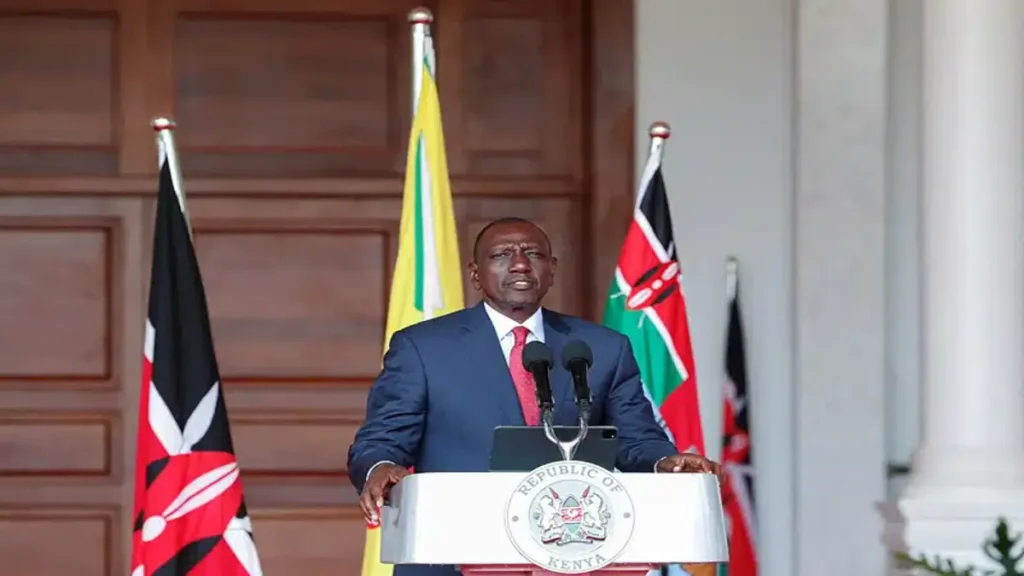President William Ruto’s Cabinet has announced significant improvements in Kenya’s economic landscape. The government claims to have achieved notable success in stabilising the economy and reducing living costs.
Treasury Cabinet Secretary John Mbadi revealed impressive economic growth figures during a recent briefing. Kenya’s economy grew by 5.6% in the previous year, he reported.

The Cabinet Secretary expressed optimism about future economic performance. The government projects a growth rate of 5% for the current year. This figure is expected to rise to 5.4% in the following year.
One of the most significant achievements highlighted was the stabilisation of the exchange rate. This development has helped to ease pressure on businesses and consumers alike.
The government has also reported a remarkable decline in inflation rates. Officials say the country has achieved its lowest inflation rate in 17 years.
President William Ruto chairing a cabinet meeting at State House, Nairobi on November 14, 2024. PHOTO/COURTESY: X/@StateHouseKenya
Food security has shown marked improvement under the current administration. The Cabinet attributes this to various agricultural initiatives and policy reforms.
Fuel prices have also seen a downward trend, bringing relief to many Kenyans. This reduction has had a positive ripple effect across various sectors of the economy.
However, the economic situation remains complex. Despite the government’s positive report, some challenges persist.
Recent protests have highlighted ongoing concerns about the cost of living. Many citizens continue to express worry about their daily economic struggles.
The administration faces pressure to address these continuing challenges. Economic experts are closely monitoring the government’s responses to these issues.
International financial institutions are also keeping a close watch on Kenya’s economic management. The government must maintain its current momentum while addressing outstanding concerns.
The Cabinet’s economic team has outlined several strategies for sustained growth. These include continued focus on fiscal discipline and economic reforms.
“We have made significant strides in stabilising our economy,” Mbadi stated. He emphasised the government’s commitment to maintaining this positive trajectory.
The administration has prioritised several key areas for improvement. These include strengthening the agricultural sector and boosting small businesses.
Investment in infrastructure continues to be a crucial focus area. The government believes this will support long-term economic growth.
Job creation remains a top priority for the administration. Various initiatives are underway to expand employment opportunities across different sectors.
The government has also highlighted its efforts to attract foreign investment. Stable economic indicators are expected to boost investor confidence.
Regional trade partnerships are being strengthened. These relationships are seen as vital for sustained economic growth.
The Cabinet’s report has drawn mixed reactions from economic analysts. While some praise the progress, others call for more comprehensive reforms.
Opposition leaders have questioned some of the government’s claims. They continue to push for more immediate solutions to economic challenges.
Business leaders have expressed cautious optimism about the economic outlook. They acknowledge improvements while highlighting areas needing attention.
The administration maintains its commitment to economic transformation. Regular updates on progress are promised to keep citizens informed.
Public participation in economic planning has been encouraged. The government seeks to ensure inclusive growth and development.
Looking ahead, the Cabinet has outlined ambitious goals. These include further reduction in inflation and sustained GDP growth.
Environmental sustainability features prominently in future plans. Green energy initiatives are being integrated into economic development strategies.
Digital transformation continues to receive significant attention. The government sees technology as key to economic modernisation.
Small and medium enterprises are receiving targeted support. These businesses are viewed as crucial for economic stability and growth.
The coming months will be critical for the administration. Their ability to maintain positive economic indicators while addressing challenges will be tested.
International partners continue to monitor Kenya’s progress. Their support remains crucial for the country’s economic development plans.
The government’s economic team remains confident about its prospects. They believe the foundation for sustained growth has been firmly established.